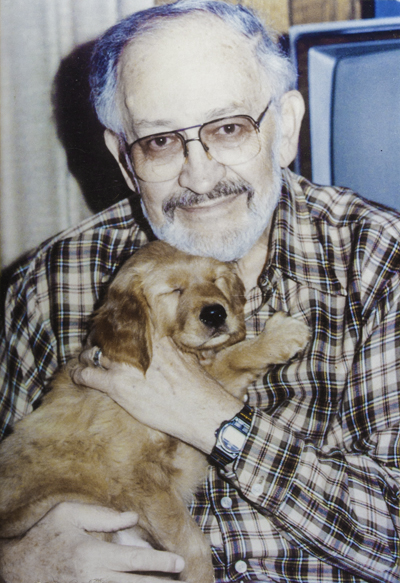About My Father
My father was the child of poor Jewish immigrants from Poland. His father was a blacksmith, and his mother was a homemaker who also took in boarders. The youngest of six children, he grew up in the Woodland area of Cleveland’s east side, a neighborhood of Eastern European immigrants steeped in Old World culture. The values of the European ghetto—respect for education, music, and family life—were brought to the United States and were dominant themes in my father’s growing up.
Beginning the early 1950s, my father worked in the food industry—first managing a slaughterhouse owned by his older brother, then as a meat salesman, and later as an executive for a large chain of supermarkets in the Cleveland area. After retirement, he worked part-time from home as a food broker. Although he was an astute and successful businessman, it was the rest of his life that really defined him.
Classical music was an enduring passion of my father’s. He studied the violin from a young age, played in a community orchestra for many years, and organized many benefit chamber music concerts for the Cleveland Orchestra. He was such a great fan of Russian violin virtuoso David Oistrakh that he finagled a visit to Oistrakh’s grave in Moscow in 1989, even though the cemetery wasn’t open to the public at the time.
My father had a deep sense of justice and welcomed the challenge of standing up for his beliefs. He was dedicated to equality and outspoken in its defense. He participated in many civil rights demonstrations as well as demonstrations against nuclear bomb testing and the wars in Vietnam and Central America. He was also an activist in his daily life. To paraphrase a line from the movie Murphy’s Romance, not only did he fight city hall, he wrestled ’em.
Growing up in a poor family, my father never had any expectation of traveling to other continents, but after marrying my mother, who had traveled extensively, his world started to grow larger. After twenty years of marriage, my parents made their first trip to the former Yugoslavia, where my mother had worked for a United Nations agency after World War II. (My father once commented that they would have been able to go much sooner if our family hadn’t consumed so much ketchup.) Once he’d had his first taste of international travel, he was hooked. He would pore over issues of National Geographic and dream up trips that, more often than not, he and my mother took. The trips were a great source of joy and meaning for my father—opportunities to make new friends, honor the history and diversity of the human family, and marvel at the endless natural beauty of our planet.
In 1966, my parents bought a parcel of land in Ashtabula County, an hour east of Cleveland, with some good friends. The land was located in a private valley along a branch of the Ashtabula River. We went there on weekends and for longer stays during holidays and summers, and after the last child left home, he and my mother built their dream home and lived there for fifteen years. Attuning to nature’s rhythms and witnessing its wonders up close—among other things, he was an avid birdwatcher—were never-ending sources of inspiration for my dad. He also found the daily activities of country living grounding, whether splitting wood, baking bread, or tending the large vegetable garden.
In his early seventies, however, the daily maintenance of the valley home became too much, and my parents moved back to Cleveland. He died about two years later, on March 7, 1991, from complications from a staph infection contracted from an unsterile IV administered by ambulance medics. After a six-week coma following open-heart surgery to replace a heart valve damaged by the infection, doctors determined that the infection had traveled to his brain and caused extensive damage. In accordance with his living will, he was taken off life support. He was lovingly supported by his family during the last months of his life.
J.A., a family friend, wrote something in a condolence card that captures much of my father’s essence:
I was saddened to hear of Lou’s death and deeply affected by it. Some people leave their mark on me instantly. Lou was such a man. He impressed me as a highly complex individual who lived intensely, loved intensely, and believed in both himself and a basic sense of justice. Yet, he always was willing to seek and grow. . . . I found inspiration in realizing who he was and the message he left—live life to the fullest and never compromise your inner core.
__________________________
Epilogue
Soon after my father died, my family filed a lawsuit against the ambulance company, claiming that his death had been caused by negligence on the part of the medics who administered an IV under unsterile conditions, which caused the staph infection. We sought legal recourse in hopes that the ambulance company, a private establishment, would be held legally responsible for the consequences of the medics’ actions and that, by being subjected to legal scrutiny, would improve its standards of medical care. The ambulance company claimed immunity from liability based on an Ohio law that applies to public agencies as well as private agencies operating under contract or in joint agreement with a political subdivision—for example, 911 medics. After several years in the courts, a judicial ruling on November 13, 1995, denied the motion of the ambulance company for immunity, thus establishing the company’s liability. My family felt satisfied that we had achieved our objective of legally establishing responsibility for the quality of medical care provided by private ambulance companies in Ohio.

